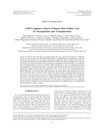 14 citations,
April 2011 in “Cell Proliferation”
14 citations,
April 2011 in “Cell Proliferation” Scientists can grow human hair follicle stem cells in a lab without changing their nature, which could help treat hair loss.
 11 citations,
September 2020 in “Steroids”
11 citations,
September 2020 in “Steroids” A new method accurately measures steroid hormones in a few hair strands and could help study chronic stress and hair loss.
 10 citations,
December 2011 in “Cell Transplantation”
10 citations,
December 2011 in “Cell Transplantation” Researchers successfully grew human hair follicle cells that could potentially lead to new hair loss treatments.
 9 citations,
July 2011 in “Scientific Reports”
9 citations,
July 2011 in “Scientific Reports” Changes in the HR gene have influenced hair growth and may lead to hair loss conditions in humans.
 7 citations,
September 2017 in “Scientific Reports”
7 citations,
September 2017 in “Scientific Reports” Mice with too much sPLA₂-IIA have hair loss and poor wound healing due to abnormal hair growth and stem cell depletion.
 6 citations,
April 2019 in “Journal of Cosmetic Dermatology”
6 citations,
April 2019 in “Journal of Cosmetic Dermatology” Hair loss affects women's self-esteem; treatments like minoxidil can help.
 4 citations,
January 2021 in “Dermatologic Therapy”
4 citations,
January 2021 in “Dermatologic Therapy” AI is effective in diagnosing and treating hair disorders, including detecting hair loss and scalp conditions with high accuracy, but it should supplement, not replace, doctor-patient interactions.
 4 citations,
January 2017 in “PubMed”
4 citations,
January 2017 in “PubMed” Increasing the dosage of minoxidil can help hair regrowth in women who didn't respond to the standard treatment.
3 citations,
August 2022 in “International Journal of Molecular Sciences” COVID-19 can cause hair loss, and treatments like PRP and stem cells might help.
 3 citations,
January 2021 in “Plastic and Aesthetic Research”
3 citations,
January 2021 in “Plastic and Aesthetic Research” Hair loss reduces hair thickness and coverage, but drug treatments mainly revive dormant hairs rather than reverse thinning; patients often undervalue their hair loss severity.
3 citations,
August 2022 in “Molecules/Molecules online/Molecules annual” A new strain of bacteria from the human skin can help prevent hair loss.
3 citations,
January 2022 in “Journal of The American Academy of Dermatology” 1 mg/day of low-dose oral minoxidil is effective and safe for treating female hair loss.
 3 citations,
March 2021 in “Metabolites”
3 citations,
March 2021 in “Metabolites” Hair loss causes differ between men and women due to changes in hormone levels and inflammation-related pathways.
 3 citations,
November 2019 in “Cosmetics”
3 citations,
November 2019 in “Cosmetics” Shampoo with Inula Helenium and Caesalpinia Sappan Bark extracts promotes hair growth and prevents hair loss in androgenetic alopecia patients.
 2 citations,
August 2019 in “Asian journal of pharmaceutical and clinical research”
2 citations,
August 2019 in “Asian journal of pharmaceutical and clinical research” Cinnamon bark extract may help prevent weight loss and hair loss in breast cancer patients during chemotherapy and is safe to use.
1 citations,
December 2023 in “Biomolecules” Regulating cell death in hair follicles can help prevent hair loss and promote hair growth.
 1 citations,
March 2023 in “Frontiers in Medicine”
1 citations,
March 2023 in “Frontiers in Medicine” Topical prostaglandin analogs may help with hair growth but more research is needed.
 1 citations,
May 2012 in “Hair transplant forum international”
1 citations,
May 2012 in “Hair transplant forum international” Hair loss in men may be caused by inflammation triggered by hormones, and treatments reducing inflammation could potentially promote hair growth.
 January 2024 in “Turkiye Klinikleri Journal of Dermatology”
January 2024 in “Turkiye Klinikleri Journal of Dermatology” Microneedling shows promise for hair loss but needs more research.
 July 2023 in “Regenerative Therapy”
July 2023 in “Regenerative Therapy” Stem cell and platelet-rich plasma therapies show promise for COVID-19 related hair loss, but more research is needed.
 July 2007 in “Faculty Opinions – Post-Publication Peer Review of the Biomedical Literature”
July 2007 in “Faculty Opinions – Post-Publication Peer Review of the Biomedical Literature” The BASP classification is a detailed system for categorizing hair loss in both men and women, but it may be complex for beginners and not fully suitable for grading female hair loss.
 January 2025 in “Clinical Cosmetic and Investigational Dermatology”
January 2025 in “Clinical Cosmetic and Investigational Dermatology” Genetic testing is crucial for diagnosing rare hair loss disorders.

Taller men are seen as more attractive, and hair loss negatively affects attractiveness.
 November 2024 in “Research Square (Research Square)”
November 2024 in “Research Square (Research Square)” Lipids may help treat hair loss by promoting hair growth through the HIF-1 pathway.
 May 2024 in “Journal of Cosmetic and Laser Therapy”
May 2024 in “Journal of Cosmetic and Laser Therapy” Injectable platelet-rich fibrin improves hair growth and reduces hair loss in women.
May 2024 in “Molecules/Molecules online/Molecules annual” Plant extracts can help prevent hair loss and promote hair growth.

Men with hair loss are seen as less attractive and shorter, and height is a key factor in attractiveness ratings.
 April 2024 in “Scientific reports (Nature Publishing Group)”
April 2024 in “Scientific reports (Nature Publishing Group)” Rosemary and neem extract may be an effective natural treatment for dandruff and hair loss.
 February 2024 in “Biomedical materials”
February 2024 in “Biomedical materials” Scientists created a lab-grown hair follicle model that behaves like real hair and could improve hair loss treatment research.

Arabica coffee pulp extract may help prevent hair loss and promote hair growth.

























